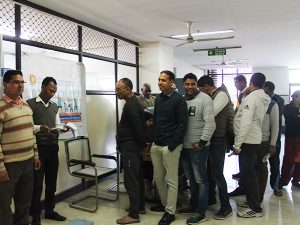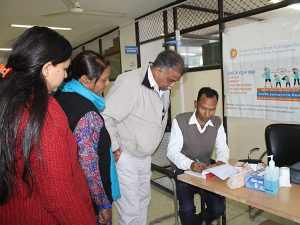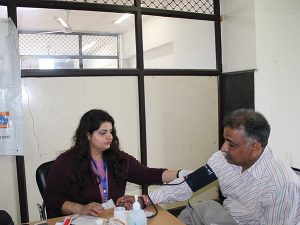| Location | Police station, Begumpur, New Delhi |
| Dates | February 17, 2020 (2:00 pm) - February 17, 2020 (6:00 pm) |
| Total Beneficiaries | 50 |
| Female Beneficiaries | 6 |
| Total Participants | 30 |
| Female Participants | 5 |
Conclusion
A total of 50 beneficiaries (6 females) attended the Swasthya Pahal camp organised on 17th February 2020 at Bengumpur, Police Station, New Delhi. More than three fourths of the beneficiaries (74%) had hypertension (i.e. blood pressure >120mm/Hg) while more than one third of the beneficiaries (32%) had high random blood sugar (> 140mg/dL). Nearly two third beneficiaries (64%) were overweight/obese (i.e. Body Mass Index > 24.9 kg/m2) and around half of the beneficiaries (54%) were engaged in regular physical activity i.e. at least 4 times in a week. Some of the beneficiaries reported lack of time as the main barrier for not being able to exercise regularly.
One third of the beneficiaries (30%) consumed alcohol and one fourth of the beneficiaries (26%) smoked bidhi or cigarette, though the quantity and frequency of smoking and drinking alcohol varied widely among the beneficiaries. All the beneficiaries found the Swasthya Pahal initiative useful and very helpful.
Additional observations / Comments
- Most of beneficiaries were hypertensive. They were managing high blood pressure through medication but not through diet.
- Most of the diabetic beneficiaries were managing diabetes through Ayurvedic medicines and home remedies. They were not regulating intake of sweets.
- Most of the beneficiaries were heavy smokers and were not willing to quit. One of the beneficiary said “yeh aadat to marne ke baad hi chutegi”. They were not willing to accept the problem.
- Most of beneficiaries were involved in regular physical exercise (mostly walking).
- One of the beneficiary was not satisfied with the Swasthya Pahal camp. He was seeking for treatment with medicines and was not interested in lifestyle counselling.
- Most of the beneficiaries were in the pre-contemplative stage. They were not concerned about their health.
Details of RISE products sold during the camp: Twenty five males and five females viewed RISE products on the day. They mostly viewed earrings, pouches and t-shirts.
RISE (Research, Innovation, Skills and Entrepreneurship), a collaborative Women Empowerment initiative of FHTS and P.H.RISE, USA, aims to Educate, Employ and Empower women, by providing them skills in research, innovation and entrepreneurship. Under RISE initiative, our aim is to create 500 sustained employment for urban slum girls. We aim to provide platform to urban slum women and girls to not only be independent but also support their families, nurture their dreams, create their own identity and be a source of inspiration to many.
Both the Swasthya Pahal and RISE initiatives, utilize SMAART™ framework conceptualized by Dr. Ashish Joshi presently Senior Associate Dean of CUNY Graduate School of Public Health and Health Policy, New York and the founder of Foundation of Healthcare Technologies Society (FHTS). Know more about his vision at ashishjoshi.me.









